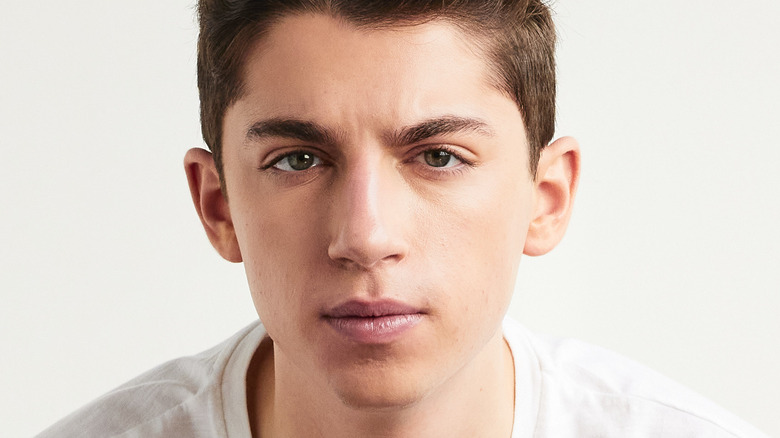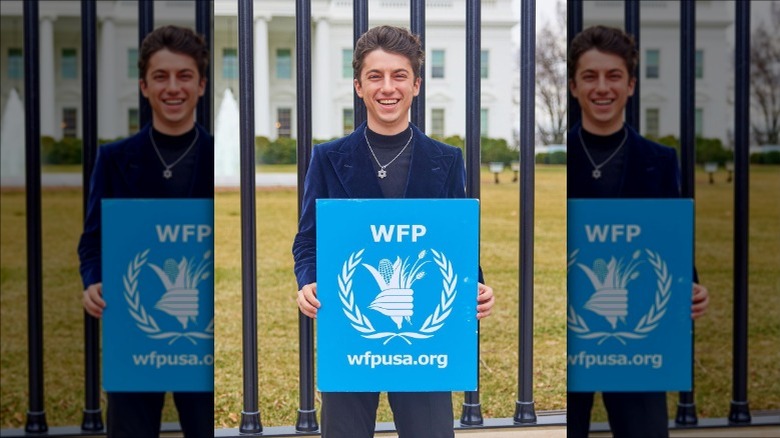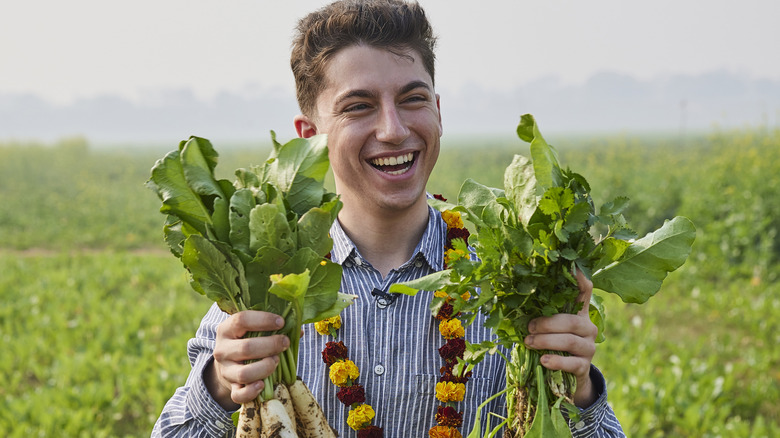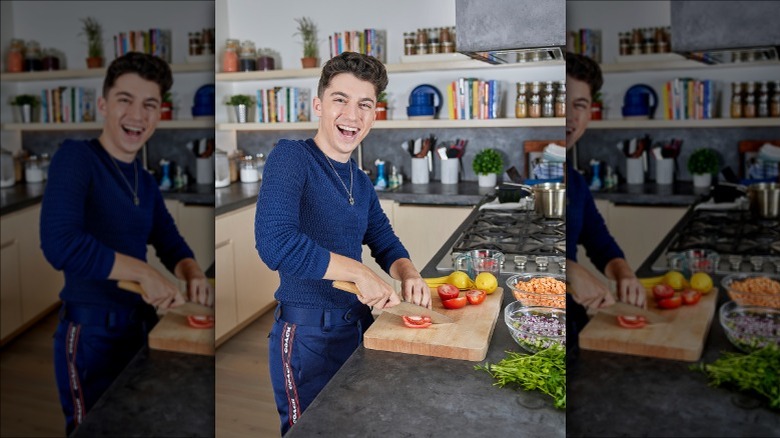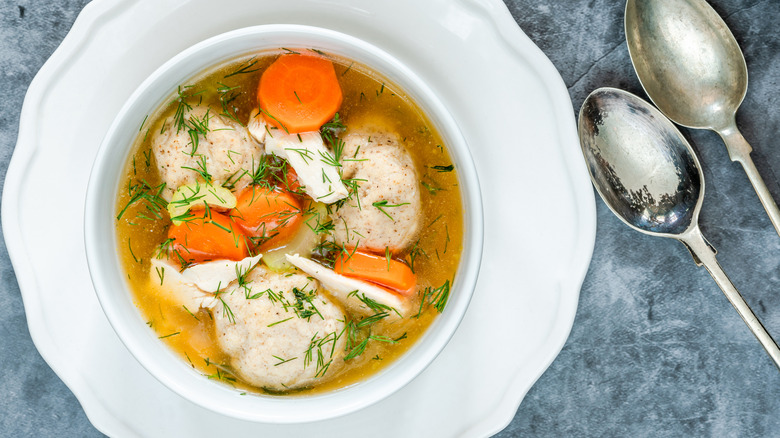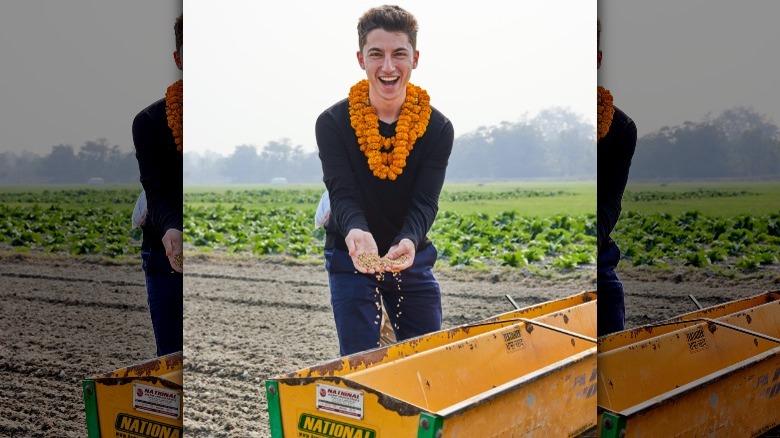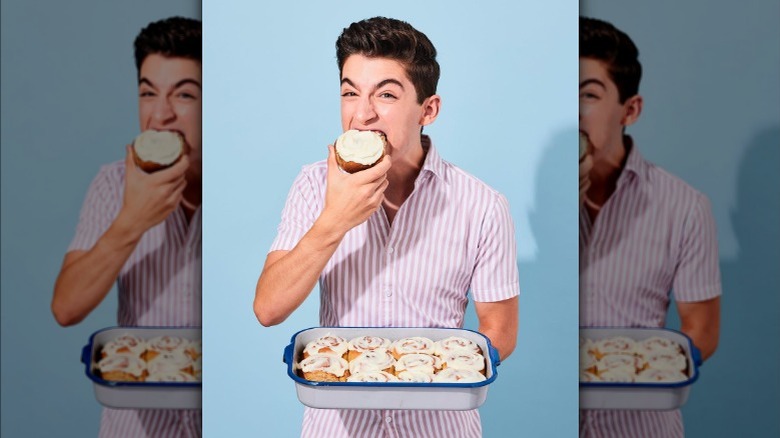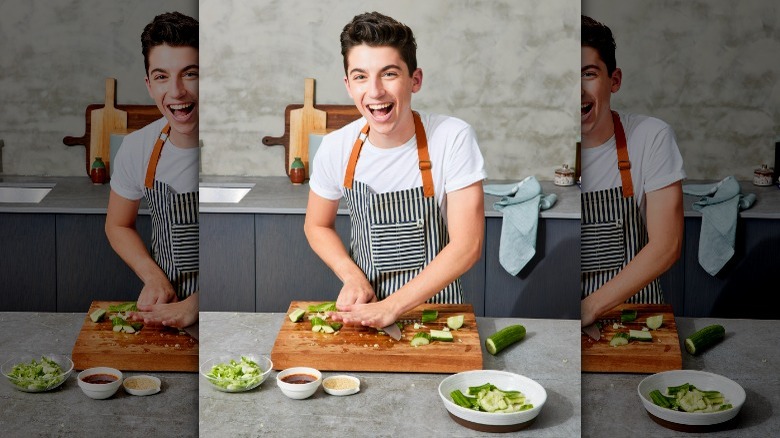Tiktok Star Eitan Bernath Fights Hunger And Explores Cultures Through Food - Exclusive Interview
We may receive a commission on purchases made from links.
You'll rarely see Eitan Bernath without a smile on his face. The 20-year-old social media sensation has become one of the most popular figures in the food world, thanks to his fun and carefree yet informative approach to creating content. Scroll through Bernath's videos and you're sure to find yourself laughing, learning, and probably craving something new by the time you're done. While Bernath is all about having as much fun as you can in the kitchen, he's also dedicated to teaching people about food and supporting social causes, using his influence to discuss issues ranging from anti-semitism to public health and food insecurity.
Now, he's taking the next step towards combining his passion for food content with his commitment to creating positive change. Bernath was recently named a High Level Supporter of the U.N. World Food Programme – and no surprise, he's the youngest person ever elevated to this position. With this title, WFP says it is excited to have the social media star use his platforms to "bring together young people to advocate for long-term solutions to food security while raising awareness about the current global hunger crisis."
In an exclusive interview with Tasting Table, Bernath discussed how he plans to use his position with the World Food Programme and his hugely successful influence, reaching 350 million people, to educate, inform, and advocate for the end of hunger around the world. Leaning into his love of global cuisine, Bernath also shared some of his favorite Jewish recipes and the foods he fell in love with on his recent trip to India. The conversation didn't end without a little food-related fun in true Bernath style, talking food trends, kitchen fails, Cardi B, and more.
How Eitain Bernath is using his influence and his platforms to help fight world hunger
You've been named a High Level Supporter for the U.N. World Food Programme. Were you surprised by this?
I was surprised initially when the opportunity came up. What has not worn off is how honored I am for this. This is not something that I take lightly and I'm incredibly honored to be able to be given this role and to be part of the work they do.
I've been working with them for quite a while, on and off. I've always said that I wanted a more solidified role to help support them, and I was so honored when this opportunity came up. This is not saying that I plan to think about once every other month. I want to be actively working on and thinking about and finding every way in which I reach people to elevate the work they do.
You've got a platform that reaches more than 10 million people. Do you have a content plan in mind for how you plan to use that platform to educate people about global hunger?
The great thing about social media is there's so many avenues to work with. I have Instagram, Facebook, TikTok, Twitter, YouTube, Pinterest — there's probably more I'm forgetting. I reach all different types of people in all different types of ways. I'm excited to have different ways to support.
For example, [during] the earthquake in Turkey and Syria, I was in the World Food Programme's D.C. offices. I met with the CEO and [their] team. With that instance, I was able to very quickly get out on my Instagram story, on my Facebook story, on my Facebook regular posts, to encourage people to donate. I'll be doing specific activations — for example, with the announcement, I have a video coming out, I have some photos going out. There's those activations [and] one day hopefully [I'll get] into the field with them to document the work that they do.
I feel really passionate about that storytelling aspect. That's one thing I'm excited about. Aside from the big activation type things, what I'm most excited about are the small things, to be there when the World Food Programme needs to get the word out about something, to be able to be that direct line of communication for them, whether it's representing them at events or speaking for them. There's so many avenues in entertainment and I'm excited to explore all of them. I'm not just looking at one or two ways to support them.
Eitan Bernath says we all need to understand the rippling effects of fighting world hunger
As you've gotten more and more involved with this cause, what has surprised you the most in learning about hunger and food inequality around the world?
There were two things. The first thing, specifically about the World Food Programme, was before I started working with them, I naively assumed they received all their funding from the United Nations. They're part of the United Nations, but they don't receive their funding from the U.N. They receive their funding primarily [from] the U.S. government and private donors.
The World Food Programme has a whole division whose job is to help get those donations. When they're rushing into Turkey and Syria to deliver food to people whose entire lives have been uprooted, that is expensive. Private donations are important because it's easy to think, "World Food Programme, it's world, it's U.N. They must have so much money, what could my $10 do?" It is important. That's something I want to get the word out [about].
Something that I saw firsthand in India is, when you live in a developed nation [with] more resources, a lot more money, it's very easy to forget how tiny things can have huge effects for people in every facet of life, especially in less developed countries and more economically challenged countries.
With food, there's tons of studies out there and the World Food Programme has resources on their website about the implications of food insecurity. If you're not food insecure, it's very easy to forget how being food insecure takes over every facet of your life. When you're hungry, when you don't know where your next meal will come from, how can you focus on school? How can you do a good job at work?
I want to be able to teach people what I've learned, which is that something as simple as someone knowing where their next meal will come from, the degree to which that changes every facet of their life, is hard to comprehend.
Do you think that younger generations have an understanding of food insecurity around the world?
With social media and the digital age, we're more connected than ever. There's more information. Information is power. Now, we have the resources to have that knowledge.
I asked the CEO of the World Food Program USA, when I was at their offices, "Why doesn't the World Food Programme do any food distribution in the U.S.?" His answer was really fascinating. In the U.S., there are safety nets, there are food pantries, there are soup kitchens. There is still food insecurity in the U.S. that's a real problem, but the World Food Programme is that safety net in parts of the world where there are no other safety nets. The World Food Programme delivers food to people who don't have any food pantry system or any soup kitchen system. The reason their work is so important is when these people have literally nowhere else to turn, the World Food Programme is where they can turn to.
How Eitan Bernath combats food waste and lots of leftovers
Something that goes hand in hand with this conversation about food insecurity is food waste, which is something that you've addressed on your platform. Recently when you were making carne en su jugo, you poured broth into the blender and swirled it around and to get all the rest of the sauce stuck to the sides — so smart. Do you have any other tricks to help eliminate food waste as you go?
I try to be very proactive about making sure that I'm being conscious of food waste, which is a challenge in food media. Everyone in food media is always trying to talk about ways to minimize food waste. For me, the amount of food I make is more than I can personally eat, usually. I try to use a lot of ways to minimize food waste.
A very simple thing that Olivia, who works at Eitan Productions, always instills [in] me, because it's something she learned in culinary school, is making sure that the things that are going to expire first, you use first. I have these big things of flour in the kitchen and it's tempting when they get low to refill it with flour, but then the flour in the bottom can stay for a while and go bad. I usually keep a lot of eggs in the house; I'm using the oldest one so that the freshest ones aren't being used first. Little things like that.
Freezing foods is great. I just went to Los Angeles for a week and a half and all these veggies in the house that I didn't want to throw out ... I roasted them and then boiled them and made a delicious veggie stock. This week, I'm having friends over one night, and I'm going to make a soup with that.
I always recommend to give people food. Donating to food pantries is important, but fresh vegetables in a small capacity aren't necessarily donatable. Give food to people. I have tons of friends around who I constantly text, "Hey, I have too much food. Do you want some food?" Sometimes when I travel, I have friends who have access to my apartment and if I'm gone, I'll be like, "I have all this food. If you want dinner one night, come to my apartment. You know where the fridge is for the food leftovers. Warm it up and eat dinner." People are like, "How do you eat all the food you make?" I'm like, "I don't, but the people around me do."
The secrets to perfecting your matzo ball soup, straight from Etian Bernath
There's some Jewish holidays coming up right around the corner. Your Jewish heritage is something that you're clearly very proud of. Recently you posted a matzo ball soup recipe. It looked so much fun. What are some of the biggest mistakes people make with this classic Jewish recipe?
The recipe we made was from my cookbook, "Eitan Eats the World." It was my Grandma Linda's chicken soup recipe. When you film collabs, between both of your schedules, people in entertainment usually have pretty busy schedules. You don't have that much time. We had about two and a half hours to film, and I was like, "Can we really do chicken soup?"
I did all the prep before and we boiled it for only an hour, which my grandma, Linda — I love her, but she claims she only cooks her soup for an hour. I'm always like, "Grandma, there's no way with how flavorful your soup is that it only cooks for hour." She swears by it; in the book, I put an hour because she's right that it's good enough.
Letting the soup sit is important. One of my grandma's secrets, besides love — which is an important ingredient, you can't replicate grandma's love, it has to be a grandma — is letting it sit overnight. It [won't] taste as good the first day.
Salt and pepper — the main thing that I always say about why restaurant food usually tastes better is fat, salt, and pepper. You could have a broth that has tons of flavor, but it needs to get that little bit of salt to get the flavor to the surface level.
What's this secret to making great matzo balls?
There's always the debate of fluffy matzo balls versus dense matzo balls. My family is team small, dense matzo balls rather than big and fluffy. The reason to me is very simple. The soup is liquid. You want the dumpling to be something that's chewy and dense and something that has structure to it. If you look at other cultures, dumplings in soup, they usually are chewier. That's where I follow that logic.
Purim's in a few weeks, Passover's a month after that. Do you have any favorite recipes that you make to celebrate these holidays?
I have a bunch of really fun collabs coming out that I'm very excited about with some people I look up to very much.
I'm doing at least two hamantaschen videos that are collaborations. About a month ago before I filmed them, I was testing the recipes to perfect them. I find with hamantaschen, getting the shaping to stay smooth can be something that's hard. I was trying to perfect that. Me and Olivia, my culinary producer who works with me in the kitchen, we tested it four to five times and I was happy as a clam. I love hamantaschen. Apricot hamantaschen, you could wake me up at 3:00 a.m. and ask me if I want one and the answer is yes. I've been pre-gaming Purim with my hamantaschen consumption, which everyone should do.
For Passover, we have matzo ball soup. Every single Seder every year, my grandma Linda makes her chicken soup and my dad makes matzo balls. My mom learned many years ago to not even try after that, because no one will eat anything else.
Eitan Bernath looks back on eating his way through India
You recently took your first trip to India. You were there for quite a while. What are some of the best things you ate?
The eating was breathtaking. I was painfully full most of the trip. Everywhere you go in India, the food culture is so rich and the people are so passionate and excited about their food. Indian food in the U.S. is thought of as this monolith of a cuisine: saag paneer, paneer masala, butter chicken, all those things. When you're in India, something that so many people in India said to me when I talked about food is, "Every 10 kilometers is another cuisine in India," which is very true.
My favorite thing — I was in Mumbai and it was in the middle of this tour I did of the synagogues of Mumbai, and our tour guide stopped at this vegetarian thali restaurant. This was the biggest thali I've had. There was probably 40 dishes on it. I was in heaven. That was probably the best meal I had.
I also then did a tasting menu in Mumbai; that was very fancy. That wasn't traditional Indian food. That was very fancy cuisine, but that was also incredible.
One of my favorite things that was so simple — I was on a rice farm in Bihar. They brought out this dish called chura matar. It was this fried puffed rice and ghee. She showed me the cow that made the ghee, which was crazy. It was lightly fried onions, puffed fried rice, and peas from their farm that they grow and that's it, maybe some salt. I ate it and it was so flavorful that I asked her, "What spices are in this? This is so flavorful." She was like, "Oh, there's nothing. That's just the rice."
You also took several cooking classes while you were there and you've been attempting some dishes since you've gotten back. What are the most important things that you learned that are crucial when making Indian food?
Spices are important — and quality spices. I brought back some spices with me. From all the different chefs I cooked with and the people I interviewed, the right combination of spices and oils are what make Indian food unique and also very regional.
Different parts of India use different fats for cooking. In Bihar, they grow a lot of mustard. I drove by thousands of mustard fields. The food in Bihar tastes like mustard. Then, I was in Goa, in South India, and they used a lot more coconut oil. That was a fascinating part. Everyone was very passionate about the spices, but the cooking fat that you used was something that I learned a lot more about while in India.
Eitan Bernath reveals his cooking collaboration bucket list
You get to cook with a lot of cool people. Who's at the top of your bucket list to either do a collaboration with [or] cook a meal for that you haven't?
That's an incredible question. I've been fortunate to cook with a lot of people that I look up to. I'd probably go into the music category section. One person is very hard. My cat's name is Cardi. I do love Cardi B. I would love to cook with her. I would love to cook with Beyoncé [or] Rihanna.
Do you know what you'd make with them?
Yes. Cardi B — I've thought of this before — I had this idea when she was starting out with Bodak Yellow. She's Dominican and Trinidadian. I wanted to make with her some type of black and yellow taco thing with yellow corn tortillas, some blackened fish or something.
[For] Beyoncé, it would have to be something with hot sauce, because she has hot sauce in her bag, so she could whip it out mid-cooking. [For] Rihanna, maybe baby food?
Kitchen fun sometimes means kitchen fails, even for Eitan Bernath
You're not really afraid to try anything in the kitchen. You have a lot of fun in your cooking. What is the biggest kitchen fail you've had recently?
One kitchen fail that I've struggled with my whole life is — I've gotten better at this than when I started out — I was pretty bad at baking, and I've gotten pretty good at yeasted doughs. My mom's gluten-free. Growing up, I didn't make that many doughs. There weren't really that many people to eat it.
I was cooking a piece of meat, and I was temping it to try to get it medium and it was way under. One thing that I've recently been learning more about is how exponential cooking meat is. You can have a piece of steak on the stove top for five minutes, and it'd be halfway there to the temp you want. That does not mean it will take five minutes more to get to your [preferred] temp. I was cooking a large piece of meat and it was three quarters the way to the temp and I was like, "This has been cooking for 10, 15 minutes. It'll probably be ready in five." Within two minutes, it had already gone to temp, but then it overcooked. That's the thing I'm trying to learn more about. I'm not vegetarian;, I just happen to eat mostly vegetarian throughout my week. I'm newer to cooking big hunks of meat, and I've been trying to learn a lot about the temps of that. I sometimes screw that up a little bit.
The food trends and cocktails Eitan Bernath is looking forward to in 2023
What are some of the biggest food trends that you see taking over this year?
Combining dishes that you love together. I did a recipe for the Washington Post that was a risotto alla vodka, which is — "decadent" doesn't even begin to describe it. It was absolute heaven. More people [will] do that because ... I don't know if it's caught on yet, maybe I need to get this going more, but if you love two dishes and you could think of a way to make them together, double the love. That's my first thought.
In the pandemic, a lot of people got into cooking and did big projects. Once people shifted back to more normal life, normal life hit them across the face again. I've definitely seen a lot more people getting into easier dinners. Meal prep's been a thing for a while. I can definitely see more easier things you can cook that night. I always talk about how cooking can be therapeutic and something that's fun. I love to blast music when I'm cooking and have fun in the kitchen. Meal prep is great, but I want to see more [cooking that is] still easy, so people can do it on a busy weeknight, that's approachable for people.
You're going to be turning 21 soon. What's the first cocktail you want to have?
I love citrus, so anything citrus related. I love lemonade.
A French 75 might be good for you, or a lemon drop martini.
Yes. I'm going to research the French 75.
Are we going to start seeing cocktail content from you this year now?
Yes, definitely. I've always loved making mocktails, and last Thanksgiving, I did a recipe I loved that was a non-alcoholic mulled wine. I love doing shrubs, which is where you ferment vinegar and fruit and it gives you that tannic alcohol flavor. I love making mocktails. Once I'm 21, [I'll] start dabbling in the world of cocktails.
Learn more about the World Food Programme, World Food Program USA, and how you can join the fight to end hunger. See the latest from Eitan Bernath by following him on TikTok.
This interview has been edited for clarity.
